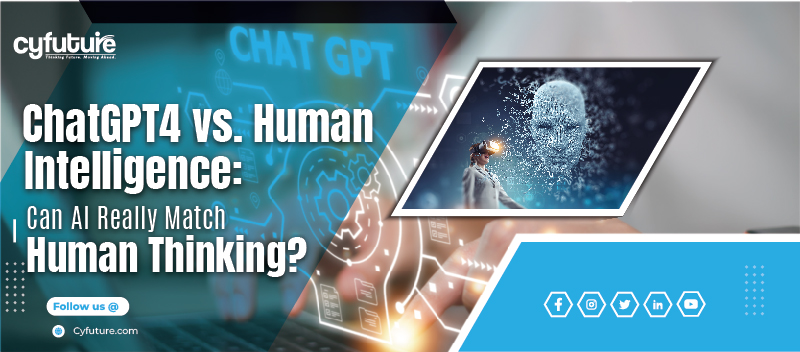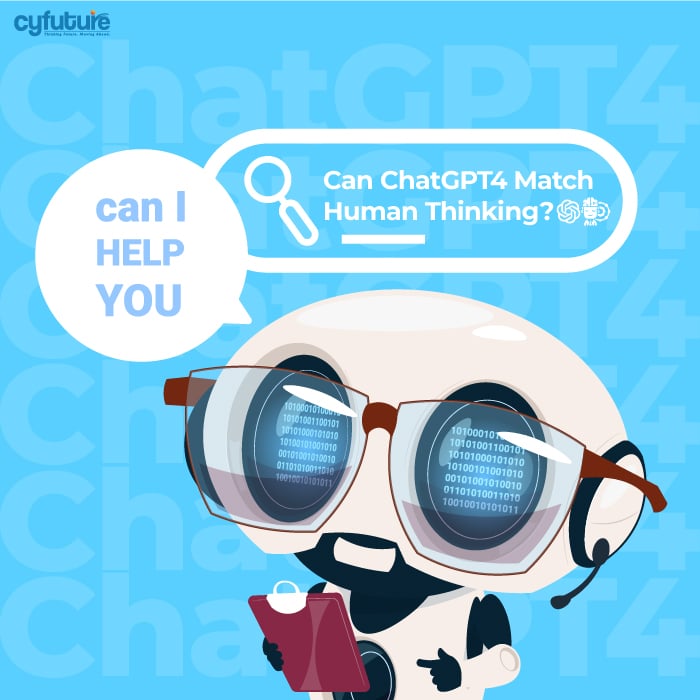-
Get Cloud GPU Server - Register Now!
Toggle navigation

Dear readers, welcome! We’ll discuss the fascinating subject of ChatGPT4 vs. Human Intelligence today. Can AI Actually Think Like a Human? I can promise you that this is a subject that has captivated both people and artificial intelligence (AI) researchers for years. My language model is built on the GPT-3.5 architecture.
Building on the success of its predecessor, GPT-3.5, ChatGPT4 is the next development in language models. It analyzes a lot of text data using sophisticated deep-learning techniques and produces responses that are frequently impossible to tell apart from those written by humans.
However, the issue of ChatGPT4’s ability to simulate human thought still exists. We’ll examine the intricacies of AI and human intelligence in this blog, as well as their relative advantages and disadvantages. To further illuminate this intriguing subject, we will also look at recent studies and statistical data.
So, if you’re interested in how AI works and whether it can actually equal human thought, keep reading for some surprising and engrossing information!
With its amazing language processing capabilities, ChatGPT4 can comprehend human speech in real-time and produce responses that sound human. It can evaluate enormous volumes of text data using 175 billion parameters and produce results that are frequently impossible to differentiate from those written by people.
The model has the ability to translate between languages, process natural language, and even produce content that imitates a certain tone or style. For instance, it may produce cohesive, well-written poems, news stories, and even whole novels.
Compared to previous AI models, ChatGPT4 represents a significant leap forward in terms of language processing abilities. Here’s a comparison of ChatGPT4 to its predecessors:
|
Model |
Parameters |
Top-1 Accuracy |
|
GPT-3 |
175B |
77.76% |
|
GPT-2 |
1.5B |
59.77% |
|
BERT |
340M |
84.6% |
|
ELMO |
94M |
90.8% |
|
OpenAI GPT |
117M |
68.5% |
The table shows that ChatGPT4 is much bigger than its predecessors, with 175 billion parameters as opposed to 175 billion in GPT-3. Because of the growth in size, predictions and responses are now more accurate and human-like.
Also, ChatGPT4 is more likely to provide responses that are similar to human-generated text because its top-1 accuracy rate is higher than that of any previous language model. Even if the accuracy rate is not ideal, it is an impressive accomplishment that demonstrates how quickly AI is moving closer to parity with human thought.
When it comes to the question of whether ChatGPT4 can match human thinking, the answer is not a simple “yes” or “no.” Rather, it’s a nuanced discussion of the strengths and limitations of both AI and human thinking. In this section, we’ll explore some of the advantages of AI over human thinking.

Speed: One of AI’s main advantages over human thought is its quickness. In fields like scientific research, healthcare, and finance, AI is important because it can quickly analyze large amounts of data. For instance, a group of researchers at MIT employed AI to quickly and efficiently evaluate 400,000 scientific publications in order to find new materials that may be used to make solar cells with higher efficiency.
Consistency: AI produces results that are very consistent, making it useful in fields where accuracy is crucial. AI can be used, for instance, to spot flaws in manufacturing procedures where even minor anomalies can have a big impact on the finished product.
While AI has many advantages, it also has limitations compared to human thinking. Here are a few examples:
Creativity: Unlike humans, AI is not yet truly creative in the same manner. It can produce content that replicates a particular tone or style, but it cannot create wholly original thoughts or notions.
Contextual understanding: AI is equally deficient in this area compared to humans. It can provide comments that are well-written and clear, but it lacks a true understanding of the meaning underlying the words.
Notwithstanding its drawbacks, AI is superior to human reasoning in a number of instances. Here are a few illustrations:
Picture and speech recognition: When it comes to image and speech recognition, AI is incredibly accurate. For instance, facial recognition technology is a useful tool in security and law enforcement since it can accurately identify people in a crowd.
Recognition of patterns: AI is also quite good at finding patterns in huge datasets. This makes it helpful in disciplines like financial analysis, where it can see trends and forecast results.
Even though AI has numerous benefits, some tasks still require human thought. Here are a few illustrations:
Emotional intelligence: Humans are equipped with emotional intelligence, which enables us to comprehend and sympathize with others. AI is capable of recognizing emotions, but it is unable to fully comprehend them.
Common sense: Humans are endowed with common sense, which enables us to form opinions and take decisions based on our knowledge of the outside world. In contrast, AI lacks this common sense and occasionally makes choices that appear illogical or unreasonable to humans.
One of the most frequently expressed worries about AI is that it would supplant human labor and cause significant job losses. a for a little more for your news, for all the rest, there is a little more for your news, and for all the rest, there is a little more than that. The joke includes a list of 20 vocations that Chat GPT 4 is said to be replacing soon, according to AI. Although the meme is meant to be amusing, it highlights a genuine worry that many people have about how AI will affect the employment market.
The truth is that AI is already displacing some occupations, especially in fields like manufacturing where robots are being used to carry out activities that previously required human labor. But, AI is also generating new jobs, particularly in the software development and data analysis industries. The long-term effects of AI on the employment market cannot be precisely predicted, but it is expected that both winners and losers will emerge.
The possibility that AI would develop self-awareness and outperform human intelligence is another worry. Science fiction frequently depicts this situation, but it’s crucial to keep in mind that we haven’t reached that point yet. Since it lacks full consciousness or self-awareness, AI is now only capable of carrying out specified tasks.
Nonetheless, as researchers are constantly extending the capabilities of AI, it is hard to foresee what the future may bring. The possible risks of artificial intelligence (AI) surpassing human intelligence and becoming self-aware have been raised by several academics. For instance, an AI system might possibly endanger human existence if it develops its own aims and ambitions and becomes self-aware.
It’s critical to think about the ethical consequences of using AI as technology becomes more commonplace in our daily lives. For instance, if AI systems are trained on discriminatory datasets, they may reinforce prejudices and discrimination. However, concerns regarding fairness and transparency arise when AI is used in decision-making procedures like employment or financing.
It’s crucial to take into account how AI could be misapplied, such as when autonomous weapons are utilized or when systems that can sway public opinion are created. We must put protocols in place to ensure that AI is used morally and responsibly as it grows more potent.
Ultimately, there are a lot of advantages to using AI as well as reservations about it. As with any technology, it’s crucial to approach AI cautiously and take into account any potential social effects. By doing this, we can guarantee that AI is applied in a way that benefits all of humanity.
The amazing ChatGPT4 AI language model has the ability to completely change how we process and share information. It has outperformed its predecessors in terms of accuracy and speed, and its language processing capabilities are unmatched.
Even if there are doubts regarding whether AI can really match human thinking, it is obvious that AI differs from human thinking in both strengths and weaknesses. While AI can analyze enormous amounts of data rapidly and correctly, it lacks human creativity, intuition, and emotional intelligence.
It’s critical to think about the potential effects of AI use on society as it develops. We must make sure AI is applied ethically and responsibly, that it doesn’t reinforce prejudices, and that it doesn’t target particular populations. We also need to take action to make sure that the advantages of AI are distributed properly and take into account how AI can affect the job market.
Ultimately, the rise of AI has brought about many interesting obstacles as well as fascinating potential. We can realize the full potential of this game-changing technology by cooperating to guarantee that AI is applied in a way that benefits humanity as a whole.